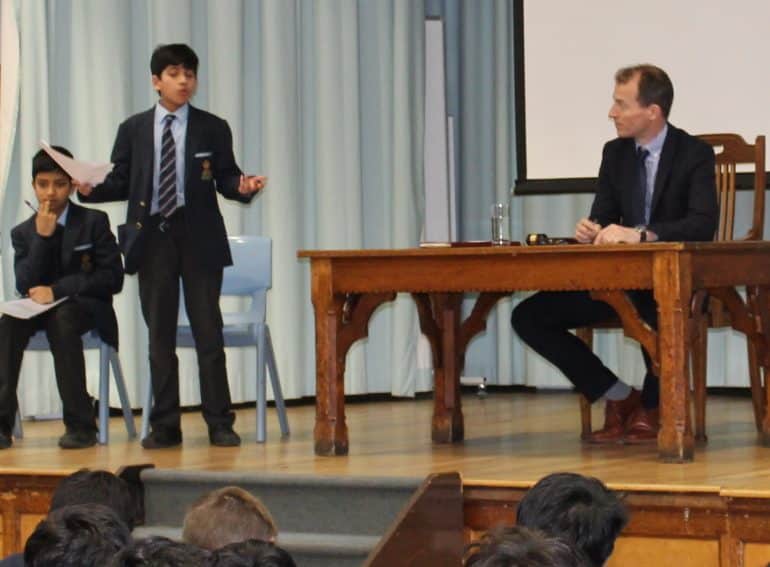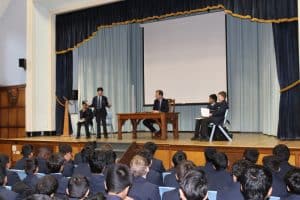
Broughton overcame Pearce by just two points in the final of the Year 7 Inter-House Debating Competition.
 Broughton proposed the motion: This house believes that climate change is the biggest danger facing the modern world. The debate took place just before the current Coronavirus crisis erupted globally.
Broughton proposed the motion: This house believes that climate change is the biggest danger facing the modern world. The debate took place just before the current Coronavirus crisis erupted globally.
The debate provoked passionate and even provocative contributions, including the view that climate change was largely a ‘first world’ preoccupation, and a claim that a rising death toll due to climate change would have a positive side.
Pranav Challa, the main speaker, had five minutes to make his case. In support of the motion. Head of English, Robert Hyland, who organised the event said: “He was a confident, articulate speaker. He described what he sees as the three ‘cruxes’ of the dangers we face: food production, shelter and water.”
Pranav went on to describe how climate change will affect food production in a world in which more than 1 billion people are already suffering from malnutrition. He said that extreme weather could affect our future supply of drinking water, that rising sea levels are putting coastal communities in danger, and that 200 million people will be displaced in the next 20 years.
Pranav was supported by the second speaker, Kavin Rameshshanker, who spoke about drought, the impact of climate change on the global economy and the loss of bio-diversity, ten species becoming extinct every day.
In his five-minute response, Adokshaj Magge, of Pearce, sought to challenge the terms of the motion. He suggested that the preoccupation with climate change comes from the privileged perspective of developed countries. “He spoke passionately about poverty, about disease and about the lack of basic healthcare in many countries,” said Mr Hyland.
Adokshaj described the overuse of forest fuels and deforestation as the “mother of all problems” and argued that the 3 billion people living in, or facing, poverty do not have time to worry about climate change when they are battling for day-to-day survival, while often being denied their human rights. He argued that changes in the weather have been going on since the dawn of time.
Pearce’s second speaker, Colin Copcea, suggested that we face more important issues than climate change, such as who will be the next president of the US, Brexit and terrorism. “Right now, climate change is not at the top of the list,” he said. He also talked about economic crises, referencing, in particular, Venezuela.
In the following floor debate, Adam Liang, Kayilai Dinesh and Ishaan Bhandari for Broughton pitted their wits against Jamie Reeve, Ayan Hirani and Johnny Yassa from Pearce. “Some great points were made,” said Mr Hyland.
Adam said that problems caused by human greed, such as deforestation, were intrinsic to the issue of climate change.
“There was a suggestion that climate change is actually helping to reduce over-population,” said Mr Hyland. “This was vigorously challenged!”
The opposition suggested that our focus should be on tackling treatable and preventable diseases, as climate change might not have a solution.
Chairing the event, Crispin Bonham-Carter, who is Assistant Head (Pupil Involvement), commended the boys on the quality of the debate. He announced the indicative vote from the floor was an exact draw – 68 to 68 – and noted that some boys on each side had voted against their own House.
Year 13’s Ryan Ratnam, who invigilated, congratulated all the speakers. “I was very impressed with the ‘three cruxes’ argument and the summary speech from the proposers. I also thought Broughton was a good team; there was good synergy between the two main speakers,” he said.
“Pearce made a very good point about our stance, as a developed country, being privileged. They also presented some really good information. I thought the floor contribution about over-population was intriguing.”
He described it as a very even and well-argued debate, but gave a decision to the proposing team, Broughton by two points.
